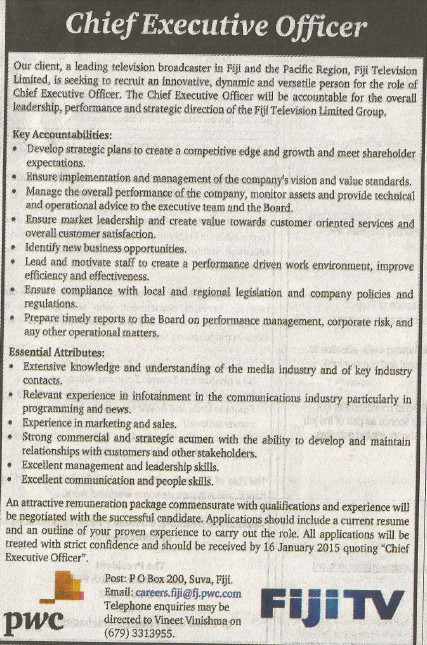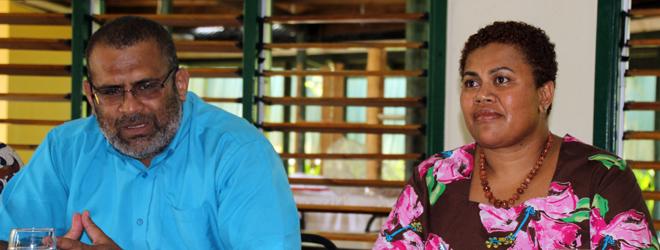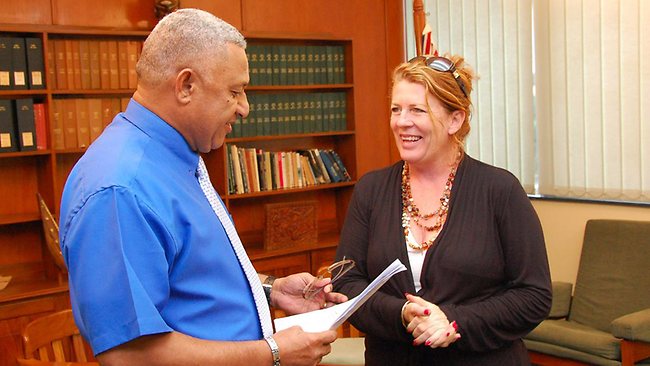Fijileaks Investigation Team
It’s been confirmed by a source close to the accountancy firm PWC, that the popular and well-respected former Fiji TV ceo Ken Clark has applied for his old job – putting him on a collision course with Sharon ‘chief censor’ Smith-Johns, the former Ministry of Information permanent secretary, who, it is also understood, has applied.
The Board of Fiji TV is scheduled to meet Thursday, January 29, where the CEO position is top of a very crowded agenda.
The business community is watching the decision closely to see to what extent the board of a private company is robust enough to select the candidate who is best for the business and shareholders (Ken Clark) or be brow-beaten into selecting the person who is best for the interests of the Bainimarama government (Sharon Smith-Johns) who wants to see a weakened Fiji TV. It was the pre-election Bainimarama regime that signed up to be the guarantor of almost $25m worth of loans and interest from the Fiji Development Bank and ANZ to build the white elephant that is FBC TV, while passing a series of decrees that advantaged FBC TV over Fiji TV.
The way that the job advert has been worded appears to open the door to Smith-Johns who has no management experience in either radio or television. There is no specific reference to experience required in the broadcast industry – just experience and knowledge of the ‘media industry’ and ‘communications industry’. She was a regional print ad and online ad saleswoman for Fairfax newspapers before moving to Fiji to head the Connect internet company.
Smith-Johns would be the preferred candidate of the Attorney-General Aiyaz Khaiyum who single-handledly precipitated the Fiji TV leadership crisis in early December by taking on the International Rugby Board/World Rugby in order to help the government-owned and heavily indebted FBC TV – run by his brother Riyaz - access to the popular 7s Series TV coverage. The rights to this were held on an exclusive basis by Fiji TV.
In a series of confidential emails, texts and documents at the time of the World Rugby 7s coverage crisis, revealed exclusively by Fiji Leaks, Khaiyum was clearly shown to be putting intolerable pressure on the majority owners of Fiji TV, Fijian Holdings, using the carrot of a 12-year extension to their broadcast licence.
Currently Fiji TV has a 6-month licence, the extension of which – bizarrely - is in the sole gift of Khaiyum, even though he is brother to the CEO of Fiji TV’s main competitor, FBC TV, whose borrowings the government are underwriting.
The emails, texts and documents directly contradicted the assurances that Khaiyum gave in parliament, in writing to World Rugby and in press conferences that he, as Attorney-General and head of the Department of Information, would not and could not interfere with the decisions of a privately-held company. Khaiyum said that Fiji TV had volunteered that they were in favour of sharing the broadcast rights and no pressure was placed on them – subsequently shown to be manifestly untrue.
The thought that Smith-Johns might be appointed will send a chill through many bones.
In a 2010 profile by The Australian, Smith-Johns accepted she was the regime’s ‘chief censor’ and that when working for Telecom Fiji subsidiary Connect she had blocked the Fiji-based ISPs of pro-democracy blogs at the request of the military government.
Smith-Johns has been without a significant position since stepping down as Permanent-Secretary in October when, in a surprise move, Information lost its ministerial status and became a department under Khaiyum. In a series of resignation air-kisses Smith-Johns was described as a ‘trusted colleague’ by Frank Bainimarama while Khaiyum credited her with ‘playing(ing) an important role in the transition to our new democracy’.
But by any analysis the job should be Ken Clark’s, which is why the Board’s decision is being so closely watched by the wider business community.
After a rocky start in 1999 (then prime minister Mahendra Chaudhry threatened to deny a work permit for Clark) he successfully steered Fiji TV through two coups to immense profitability and industry acclaim through a programme of careful investment, strategic thinking and overseas expansion into PNG and the Solomon Islands.
He was given the Order of Fiji on his retirement in 2011 for services to broadcasting with the nomination lauding his ‘high standards of professionalism and the best standards of ethics and good corporate governance’.
The CV of Clark’s, submitted by PWC, shows that since 2011 he has worked as a consultant to broadcasters as far afield as Kazakhstan but he continues to reside in Fiji and recently taught a semester at the University of the South Pacific.
In the aftermath of the fiasco of Khaiyum’s broadcast land grab – which saw no TV coverage of the Dubai 7s – Fiji TV’s chairman Padam Lala and deputy chairman resigned, and the CEO Tevita Gonelevu and chief content officer Tanya Waqanika were sacked.
In subsequent press statements Gonelevu and Waqanika have said the actions of the majority-owner Fijian Holdings, and FHL’s Sri Lankan CEO Nouzab Fareed in particular, resulted in the pair of them being coerced into breaching their fiduciary duties to only act in the best interests of Fiji TV’s shareholders.








